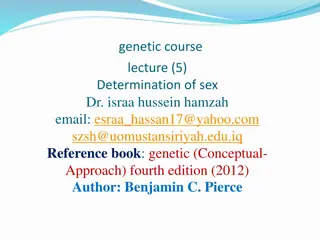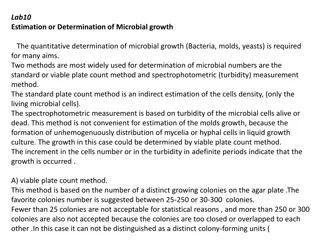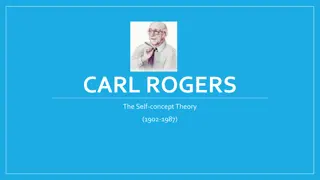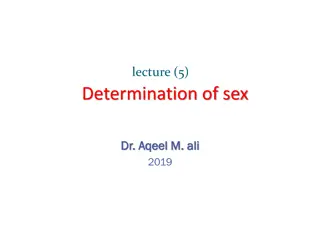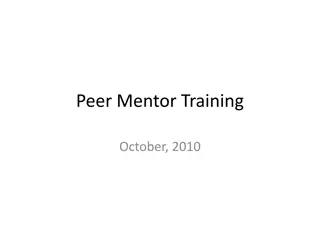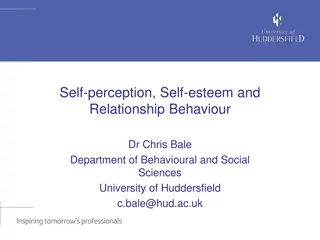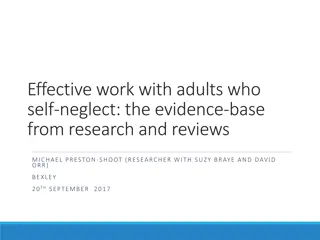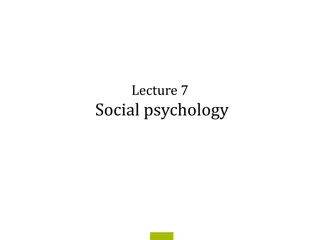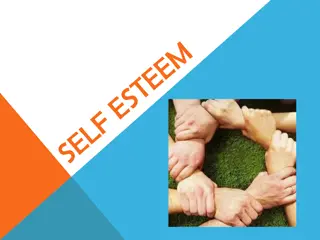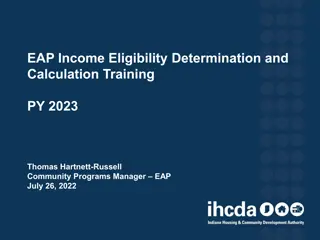Understanding Self-Worth in Children: Building a Strong Foundation
Explore the importance of self-concept, self-esteem, and self-worth in children's development. Learn how parents can positively impact a child's self-perception and self-value through nurturing experiences. Discover the key sources influencing children's self-worth and the critical role of early lif
0 views • 30 slides
Empowering Self-Advocacy in Disability Services Workshop
Explore self-determination and advocacy in disability services through real-life experiences and insights shared by self-advocates and service providers. Learn how to advocate for yourself, navigate program rules, and create connections that enhance your quality of life and support. Discover the imp
4 views • 23 slides
Self-Determination Assessment Scoring Guide
Comprehensive step-by-step scoring guides for the AIR Self-Determination Assessment and ARC Self-Determination Scale. The guide includes scoring examples, sections on what students do and feel, and opportunities for self-determination practice. Resources for setting new IEP goals based on assessment
0 views • 27 slides
Workshop on Future of Power Determination Regulations in Geneva
OICA is addressing concerns on power determination regulations for road vehicles, proposing a new UN-R to include system power determination. The agenda covers implementing system power in UN regulation, legislative scenarios, and GTR21 implementation proposals. Discussions focus on integrating syst
0 views • 9 slides
Evolution of Mathematical Theories and Proof Systems
Development of mathematical theories such as model theory, proof theory, set theory, recursion theory, and computational complexity is discussed, starting from historical perspectives with Dedekind and Peano to Godel's theorems, recursion theory's golden age in the 1930s, and advancements in proof t
1 views • 29 slides
Understanding Self-Esteem: Meaning, Importance, and Types
Self-esteem is how we perceive our worth and value. High self-esteem leads to confidence and positivity, while low self-esteem can result in self-doubt and negative emotions. Self-esteem impacts mental health, behavior, decisions, relationships, and overall success in life. Recognizing and nurturing
2 views • 15 slides
Understanding Self-Esteem and Ways to Improve It
Self-esteem is our perception of ourselves, impacting how we navigate life. Healthy self-esteem fosters positivity, while low self-esteem can be detrimental. Various factors, like childhood experiences, contribute to low self-esteem, but steps can be taken to improve it. Building positive relationsh
0 views • 14 slides
Understanding Maslow's Hierarchy of Needs in Humanistic Psychology
Humanistic psychologists, such as Abraham Maslow and Carl Rogers, viewed personality as a quest for self-determination and self-realization. Maslow's hierarchy of needs illustrates how individuals progress from fulfilling basic physiological needs to achieving self-actualization and self-transcenden
0 views • 25 slides
Psychological Theories of Criminality: Understanding the Roots
Psychological theories of criminality delve into the association between intelligence, personality, learning, and criminal behavior. Major theories include Psychodynamic Theory by Freud, Behavioral Theory by Bandura, and Cognitive Theory by Kohlberg. These theories explore how unconscious mental pro
1 views • 20 slides
Understanding Independent Facilitators in the Self-Determination Program
Unique to participants in the Self-Determination Program, Independent Facilitators (IFs) play a crucial role in assisting individuals with transitioning into SDP, finding resources, negotiating rates, and advocating at meetings. Participants may choose to have an IF or have their Service Coordinator
1 views • 26 slides
Developing a Self-Care Action Plan for Overall Well-Being
Self-care involves deliberate activities to nurture mental, emotional, physical, and spiritual health, yet it is often neglected. This guide explores the essence of self-care, emphasizes the importance of building a personalized self-care action plan, and provides insights into taking care of your b
0 views • 19 slides
Understanding the Theory of Firms: Neoclassical vs. Modern Approaches
The theory of firms is explored through the Neoclassical and Modern perspectives. Neoclassical theory focuses on profit maximization, while Modern theory delves into managerial, principal-agent, and transaction cost theories. The discussion covers criticisms of Neoclassical theory and the essential
1 views • 79 slides
Understanding Sex Determination and Sex Linked Inheritance in Genetics Lecture
Explore the principles of inheritance of characteristics encoded by genes on sex chromosomes, known as sex-linked traits. Delve into the mechanisms of sex determination across species, from monoecious organisms to dioecious species like humans. Understand primary and secondary sexual characteristics
1 views • 25 slides
Methods for Determination of Microbial Growth
Quantitative determination of microbial growth is crucial for various purposes, with two commonly used methods being the standard plate count and spectrophotometric measurement. The standard plate count method estimates living microbial cell density, while spectrophotometric measurement relies on tu
2 views • 6 slides
Theories of Causation in Psychological and Social Sciences
Overview of theories of causation categorized into psychological, social psychological, and sociological perspectives. Psychological theories focus on instinctive, biological, and psychological qualities of abusers, including Attachment Theory, Psychodynamic Theory, Social Learning Theory, and Situa
0 views • 15 slides
Carl Rogers and the Self-Concept Theory
Carl Rogers, a prominent figure in personality theory, emphasized individuals' constructive potential and the impact of their subjective experiences on personality development. He viewed individuals as goal-directed and capable of change, with the environment playing a facilitating or inhibiting rol
1 views • 78 slides
Enhancing Self-Confidence for Professional Success
Understanding the importance of self-confidence in the workplace is crucial for personal growth and career advancement. Self-confident individuals trust their abilities, maintain a sense of control over their lives, and have realistic expectations. This summary delves into the characteristics of sel
0 views • 13 slides
Understanding Sex Determination in Organisms
Sex determination in organisms involves the differentiation of male and female sexes based on gamete production, reproductive structures, and secondary sexual characteristics. This process can vary across different species, with mechanisms such as sex chromosomes, genic balance, haploidy, and single
0 views • 23 slides
Evolution of Light Theory: From Wave Theory to Quantum Theory
At the turn of the century, the discovery of the photoelectric effect challenged the wave theory of light, leading to the development of the quantum theory by Max Planck and Albert Einstein. This new theory introduced the concept of discrete energy units known as quanta, bridging the gap between wav
1 views • 62 slides
Enhancing Self-Regulation for Formative Assessment through Social and Emotional Learning
Explore the significance of self-regulation in formative assessment, understand key concepts like self-control, emotional competence, and perseverance. Discover actionable strategies to implement self-regulation interventions with students and train other adults effectively. Future orientation and s
0 views • 25 slides
Self-Assessment and Personal Development Insights
Explore a self-assessment journey focusing on behaviors, skills, and capabilities in areas such as determination, self-motivation, communication skills, and financial literacy. Discover personal strengths in self-discipline and computer literacy, along with areas for improvement like communication a
0 views • 13 slides
Understanding Mindful Self-Judgment and Its Role in Mental Health
Mindful self-judgment is a complex concept that involves balancing self-awareness and self-compassion. While nonjudgment is a key aspect of mindfulness practices, there is a debate on whether mindful self-judgment can be appropriate and functional in certain circumstances. Researchers like June Pric
2 views • 46 slides
Sex Determination Through Bone Analysis in Forensic Anthropology
In forensic anthropology, the pelvis and skull are crucial in sex determination, with additional assistance from femur, tibia, and humerus measurements. This data sheet guides on circling male or female based on traits like sub-pubic angle, pelvic cavity shape, eye orbit sharpness, zygomatic process
0 views • 33 slides
Peer Mentor Training and Self-Determination Support Overview
Explore the world of peer mentor training and self-determination support through images and detailed explanations. Discover the role of peer mentors in fostering self-determination, communication skills, and active listening techniques. Learn how to empower mentees to be self-determined and make inf
0 views • 10 slides
Understanding Self-Esteem: Highs and Lows
Self-esteem is the judgment we hold about ourselves, shaped by experiences and relationships. High self-esteem individuals embrace new encounters with confidence and positivity, while low self-esteem individuals struggle with self-doubt and criticism. Recognizing signs of low self-esteem is crucial
0 views • 11 slides
Overview of Tribal Self-Governance Program and PROGRESS Act
The Tribal Self-Governance Program, under the Indian Self-Determination and Education Assistance Act, allows tribes to operate services efficiently. The PROGRESS Act, signed into law in 2020, enhances self-governance and self-determination for Indian tribes by creating administrative efficiencies. I
0 views • 14 slides
Reforming Income Assistance for First Nations: Building Towards Self-Determination
Income Assistance Reform for First Nations aims to address the longstanding gaps in the current program, focusing on enhancing self-determination and support for thriving communities. The initiative involves a co-development process led by First Nations to make the program more responsive to their u
0 views • 9 slides
Understanding Supported Decision-Making for Self-Determination
Capacity is the ability to process information effectively, make informed decisions, and communicate choices. It can vary over time and situations. Guardianship, a court-mandated solution, limits individual autonomy and decision-making rights. Families may seek guardianship due to various reasons, b
0 views • 29 slides
Boosting Your Child's Self-Esteem & Confidence in Parenting Workshop Series
Understanding self-esteem in children is crucial for their emotional development. Healthy self-esteem leads to positive behaviors, while low self-esteem can result in negative self-perceptions. Recognizing signs of healthy and unhealthy self-esteem allows parents to support and nurture their child's
0 views • 11 slides
Enhancing Self-Efficacy and Self-Determination in the Workplace
Establishing high levels of self-efficacy and self-determination in the workplace is crucial for accomplishing tasks and goals effectively. This publication explores the significance of these traits, providing strategies for managers to foster and maintain them. Discover why self-efficacy and self-d
0 views • 8 slides
Theories of Interest in Microeconomics II
Explore various theories of interest in economics, including the Classical Theory, Liquidity Preference Theory by Keynes, Productivity Theory, Abstinence Theory, Time-Preference Theory, Fisher's Time Preference Theory, and the Loanable Fund Theory. These theories offer different perspectives on the
0 views • 6 slides
Understanding Self-Perception, Self-Esteem, and Relationship Behavior
The discussion explores the impact of low self-esteem on various psychological issues, societal views on self-worth, self-perception biases, and the consequences of self-esteem in different aspects of life, backed by research and theories such as the Better-Than-Average Effect and Sociometer Theory.
0 views • 19 slides
Female Genital Tract Development and Sex Determination Overview
Professor Muhsin A. L-Sabba, a renowned gynecologist, delves into the normal development of the female genital tract, sex determination process, and related concepts. Learn about the differentiation of tissues into male or female organs, the role of hormones in puberty and secondary sex characterist
0 views • 15 slides
Embracing My True Self Through Adversity
Embrace the journey of self-acceptance and empowerment through the powerful lyrics of "This Is Me." The song encapsulates the resilience and strength needed to rise above judgment and celebrate individuality. With determination and courage, the protagonist finds beauty in their scars and refuses to
0 views • 6 slides
Approaches for Promoting Self-Determination in Students
Four key approaches for promoting self-determination in students include utilizing student-driven IEP and transition planning, directly teaching skills or enhancing knowledge, embedding instruction into the general curriculum, and employing Person-Centered Planning. These strategies aim to empower s
0 views • 29 slides
Understanding Self-Neglect in Adults: Challenges and Research Insights
This content delves into the complex issue of self-neglect in adults, covering its definition, key challenges, and the research evidence available. It explores the various aspects of self-neglect, including neglect of self-care, domestic environment, and refusal of services. The challenges associate
0 views • 39 slides
Understanding the Self in Social Psychology
Delve into the concept of the individual and the self in social psychology, exploring how identities have evolved historically and the distinction between collective and individual selves. Learn about self-awareness, Wundt's differentiation of I and me, and Higgins' self-discrepancy theory, shedding
0 views • 84 slides
Office of the Ombudsperson for Self-Determination Overview
The Office of the Ombudsperson for Self-Determination, headed by Katie Hornberger in the Department of Developmental Services, plays a crucial role in assisting with disputes, investigations, and facilitating solutions. Established under specific laws, this independent office focuses on providing in
0 views • 8 slides
Boosting Self-Esteem: Benefits and Tips for Improvement
Understanding self-esteem, its benefits, and risks of low self-esteem are essential for personal growth. Developing high self-esteem can lead to increased self-respect, goal achievement, and willingness to try new things. On the other hand, low self-esteem can make individuals vulnerable to peer pre
0 views • 10 slides
Income Eligibility Determination Training for PY 2023
Explore the key changes and considerations in income eligibility determination for the upcoming program year 2023, including the use of State Median Income and Federal Poverty Guidelines. Learn about the refined definition of the income eligibility period and the importance of monitoring household i
2 views • 34 slides












